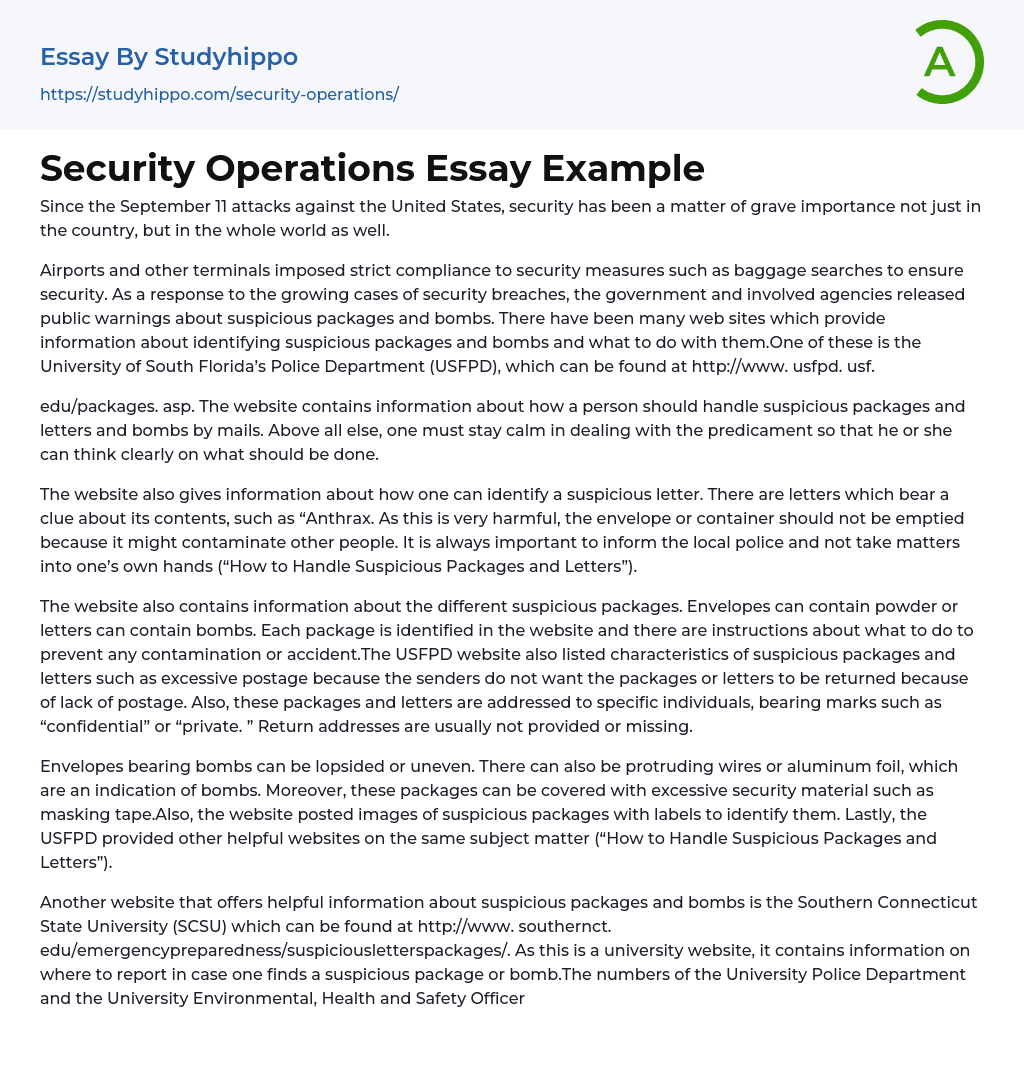Given the September 11 attacks, ensuring security has become a critical concern globally.
Airports and other terminals have implemented stringent security measures, including baggage searches, to ensure the safety of passengers. In response to the increasing instances of security breaches, government and affiliated agencies have issued public warnings regarding suspicious packages and bombs. Numerous websites provide information on how to identify such items and what actions to take. The University of South Florida’s Police Department (USFPD) is one of these resources, accessible at http://www.usfpd.
Visit usf.edu/packages.asp for information on how to appropriately handle suspicious packages, letters, and mail bombs.
Remaining calm is crucial when dealing with a predicament in order to think clearly about the necessary actions. The website also provides guidance on how to identify a suspicious letter. Certain letters may offer clues to their cont
...ents, like the presence of "Anthrax", a highly harmful substance. It is important not to open or empty the envelope or container to avoid potential contamination to others.
It is crucial to inform local law enforcement and refrain from taking matters into one's own hands ("How to Handle Suspicious Packages and Letters"). The website provides details on various suspicious packages, including envelopes containing powder or letters containing bombs. Each package is described on the website, along with instructions on how to prevent contamination or accidents. Additionally, the USFPD website features a list of characteristics that make packages and letters suspicious, such as excessive postage to avoid returns. The packages and letters are addressed to specific individuals and may bear markings like "confidential" or "private."
"Return addresses are often absent or omitted on packages containing bombs. These packages may also appear lopsided or uneven, wit
protruding wires or aluminum foil indicating the presence of a bomb. Excessive security materials such as masking tape may also be used to cover these packages. Additionally, the website features images of suspicious packages along with labels for identification purposes. The USFPD also provides links to other informative websites on the topic of handling suspicious packages and letters, such as 'How to Handle Suspicious Packages and Letters.' Southern Connecticut State University (SCSU) is another website that offers valuable information on suspicious packages and bombs, which can be accessed at http://www."
Southern CT. edu/emergencypreparedness/suspiciousletterspackages/. This university website provides information on how to report a suspicious package or bomb. It includes contact numbers for the University Police Department and the University Environmental, Health and Safety Officer (EHSO) ("Suspicious Letters/Packages"). The site also explains the roles of the senior police officer and EHSO when dealing with such incidents. Additionally, contact numbers for other police departments are provided.
The SCSU website offers more comprehensive information compared to the USFPD website. It provides guidance on minimizing or preventing the impact of suspicious packages and bombs. This involves evacuating the area where the package or bomb is found, as well as assigning cleanup duties to experts. The website also provides guidelines for identifying suspicious packages and bombs. Additionally, it includes instructions for handling unopened letters or packages suspected to be suspicious, as well as envelopes containing powder. Similar to the USFPD website, it also covers handling contamination by air or aerosolization. Furthermore, the SCSU website offers guidance on dealing with radiological contamination and mail bomb incidents.
Both websites provide advice on how to handle suspicious packages, letters, or bombs. However, the addition of visual
aids would improve their effectiveness. Both sites emphasize the importance of avoiding physical contact with the package. Adequate training is crucial for a successful emergency response and it is the responsibility of police officers and law enforcement personnel to handle situations involving suspicious packages and bombs responsibly.
Law enforcement personnel play a crucial role in meeting public needs and must be constantly prepared. Training provides them with the necessary knowledge, skills, abilities, and attitude to effectively handle various situations. Comprehensive training is essential for their safety and the safety of the public, especially when dealing with hazardous scenarios like bomb handling and emergency response. It enables law enforcement officers to carry out their emergency action plan efficiently. The internet offers several websites that provide valuable information on identifying suspicious packages and bombs, as well as instructions on how to handle these situations.
The USFPD and SCSU websites offer information about the description of packages and bombs. In cases where these packages contain hazardous substances and explosives, it is important for trained police officers and law enforcement personnel to deal with such incidents. By undergoing thorough training, these individuals gain the essential skills, knowledge, and abilities to efficiently handle these situations. As a result, they are the suitable individuals to be assigned when identifying suspicious packages and bombs.
- A Policeman essays
- Internet Privacy essays
- Cyber Security essays
- Agreement essays
- Business Law essays
- Common Law essays
- Community Policing essays
- Constitution essays
- Consumer Protection essays
- Contract essays
- Contract Law essays
- Copyright Infringement essays
- Court essays
- Crime essays
- Criminal Law essays
- Employment Law essays
- Family Law essays
- Injustice essays
- Judge essays
- Jury essays
- Justice essays
- Lawsuit essays
- Lawyer essays
- Marijuana Legalization essays
- Ownership essays
- Police essays
- Property essays
- Protection essays
- Security essays
- Tort Law essays
- Treaty essays
- United States Constitution essays
- War on Drugs essays
- Android essays
- Application Software essays
- Benchmark essays
- Computer Network essays
- Computer Programming essays
- Computer Security essays
- Computer Software essays
- Cryptography essays
- Data collection essays
- Data Mining essays
- Graphic Design essays
- Information Systems essays
- Internet essays
- Network Security essays
- Website essays
- World Wide Web essays




